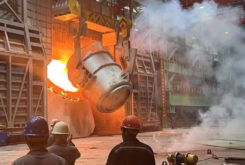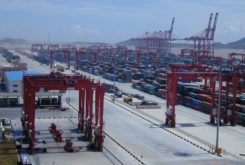A giant Sino-Mozambican port project has a new local partner, the Muyaque Group, linked to one of the country’s most important families.
The Chongoene port project will involve an estimated investment of US$3 billion. In addition to the port, it involves a railway connection to the Limpopo Corridor in Macarretane, and links to Chibuto (Gaza) and Jangamo (Inhambane), where sand extraction projects are situated. The port is close to Xai-Xai, which is 233 kms north of Maputo, the capital. This key infrastructure project will serve the central-south region of Mozambique for the strategic and fiscally significant export of raw materials.
The name of the Muyaque Group emerged at the China-Mozambique Business Forum, promoted by the Beijing government in September, on the sidelines of the Forum for China-Africa Cooperation (FOCAC) which was attended by Mozambican president Filipe Nyusi.
Muyaque is chaired by Leonardo Simão and has ties to former president Joaquim Chissano. It will promote the project with China Railways International Group (CRIG). In addition to the port, the project comprises railway links to Inharrime and Chibuto because of the heavy sand projects there. These alone are considered sufficient to make the project viable, together with agriculture, forestry and livestock production in the region.
Following a preliminary assessment, the two sides are discussing details of how to move forward to detailed studies; they will determine the definitive costs, the time of construction and the return on investment. Once the studies are completed, they will be submitted to the government of Mozambique for a final decision.
Since the start of the project in 2015, the local partner was a company belonging to Olívia Machel, daughter of former president Samora Machel. She even presented it to the government of Zimbabwe, in the person of the former minister — and current president — Emmerson Mnangagwa, and signed a memorandum of understanding with Zimbabwean companies.
This change in partner comes when the Machel family, and chiefly former first lady Graça Machel, is under increased pressure, due to political turmoil inside Frelimo. Relations between Graça Machel and other wings of the party, including that of president Nyusi himself, are internally described as tense. The former first lady, who was married to former South African president Nelson Mandela, is concerned with possible consequences to her business ventures.
At the root of the turmoil was the unsuccessful attempt by her protege Samora Machel Jr. “Samito” to obtain support of Frelimo for its candidacy to the Maputo municipality. After he lost the nomination, “Samito” decided to present himself in the recent municipal elections; he led the lists of AJUDEM, an NGO related to FRELIMO, but his candidacy was blocked due to alleged administrative irregularities.
Among the children of Samora Machel, only “Samito” and Olívia, daughter of Sorita Tchaicomo, Samora Machel´s first wife, have assumed a prominent social and business role. Olivia manages family properties in Chilembene, Samora Machel´s birthplace, in Gaza province.
Samito’s professional career has been linked mainly to the private sector, in particular General Raimundo Pachinuapa (RP), a member of the Frelimo Political Committee and now an entrepreneur. He is partner of Gen Alberto Chipande in several projects in the north of Mozambique, mostly in Cabo Delgado province.
According to the Program for Infrastructure Development in Africa (PIDA), Africa is the continent with the largest need of infrastructure investments, estimated at US$93 billion a year; it has a shortfall of US$32 billion. Efficient interfaces with ports and airports are critical to foster regional integration and boost trade, both domestic and cross-border. Mozambique’s rail infrastructure has deteriorated because of decades of under-investment.
The discovery of huge natural gas and coal reserves in Mozambique since 2010 has caused a fast increase in foreign direct investment (FDI). This is a strong opportunity for national development; the country can generate billions of dollars in investment, which local business groups are eager to be a part of.
In the wake of the “hidden-debt” crisis in 2016, the economy has experienced a sharp slowdown, with real GDP growth this year falling to an estimated 3.4 per cent, half as much as in previous years. In spite of the slowdown, Mozambique remains one of the main destinations of FDI in the continent, largely due to resource-related projects.
The Nacala Logistic Corridor opened in May 2017; it has 912 km of railway linking the coal mines of Moatize to the port of Nacala. It is generally considered one of the structural axes of the future Mozambican economy.
Another key corridor is the Moatize (Zambezia province)-Macuse railway and port project, which is the responsibility of Thai Moçambique Logística S.A.



